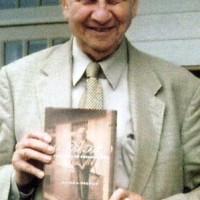Peter Thiel is an internet billionaire and libertarian icon. He is known for, among other things, blaming the welfare state on the 19th Amendment and for hoping to use the internet to create virtual currencies free from banking and government cabals:
Thiel, who is openly gay, wants to flee the mob, not rally it through gold-hoarding or flag-waving. Having given up hope for American democracy, he writes that he has decided to focus “my efforts on new technologies that may create a new space for freedom.” Both his entrepreneurship and his philanthropy have been animated by techno-utopianism. In founding PayPal, which made his first fortune when he sold it to eBay for $1.5 billion in 2002, Thiel sought to create a global currency beyond the reach of taxation or central bank policy. He likewise sees Facebook as a way to form voluntary supra-national communities.
He is also a secessionist, hoping first to secede from dry land, and then from the Earth itself:
Offline, Thiel is the lead backer of Seasteading, a movement to create law-free floating communes based on voluntary association. … Thiel is also an investor in space exploration, with the avowed aim of creating new political structures even farther offshore. That could take some time, but Thiel—who loves robots and science fiction—has a plan for that, too. He has given millions to the Methuselah Foundation, which does research into life-extension based on the premise that humans can live to be 1,000 years old. At PayPal, he proposed making cryogenic storage an employee perk.
The Thiel Fellowship will pay would-be entrepreneurs under 20 $100,000 in cash to drop out of school. In announcing the program, Thiel made clear his contempt for American universities which, like governments, he believes, cost more than they’re worth and hinder what really matters in life …. His scholarships are meant as an escape hatch from these insufficiently capitalist institutions of higher learning.
Slate proceeds with a lot of hand wringing about the squelching of intellectual development in favor of the pursuit of filthy lucre, but Thiel may actually be more right than he knows: for as some have argued, it may turn out that both intellectual development and the pursuit of filthy lucre are best pursued without the millstone of a college degree (and the debts, both monetary and intellectual, that come with it).
* The funniest line of the whole Slate piece is this one, apparently written in utter earnestness: “It should be noted that Thiel has also supported some genuinely good and useful causes, like the Committee to Protect Journalists.”







7 comments
D.W. Sabin
…”an interesting and strange political/cultural landscape”. “Strange” perhaps, nyet on the “interesting”. Polling and the telly wrung every bit of “interesting” out of it. A head of the World Wrestling Entertainment Corporation buying a seat in the Senate is only strange, barely so given the current circumstances . There is nothing interesting about it. It is only interesting to those who might like to attend public executions.
Kevin J. Jones
Anybody know how Thiel got on First Things magazine’s finance committee? Has to be a story there.
Caleb Stegall
Patrick & Russell, I agree with you both. I note Thiel and the Slate reaction simply as an interesting and strange phenomenon on an interesting and strange political/cultural landscape.
John Médaille
I think he’s been reading too much of Heinlein, “The Moon is a Harsh Mistress”; he can set up a colony on the moon and throw rocks at the Earth.
Patrick Deneen
Caleb,
As you know, the enemy of my enemy is not necessarily my friend. I am pretty sure you’re right that “filthy lucre” can be very well pursued without a university degree, and that’s Thiel’s point. I’m also quite certain that he would be as hostile to a restoration of the university as a place of liberal education as he is now toward its orientation as the purveyor of political correctness. As ever, the half-rightness of libertarians is tempting to embrace, but it’s a dangerous serpent to hold near.
Russell Arben Fox
This is spectacular; I wish Thiel would swing by Kansas. I could point out to him a half-dozen students without thinking hard who would be far better off, and who could likely do far more to help society, if they’d get out of school and do something with their lives without worrying about credentials. Thanks for sharing this, Caleb. (Though, one point: Slate may be right that Thiel’s reasoning is that universities are “insufficiently capitalist institutions,” but even if so, the author should have realized–as Thiel should realize–that what he’s proposing is just as a democratic socialist remedy as it is a libertarian one. After all, the idea of granting to people a universal basic income shares essentially the same premise as Thiel’s proposal: to free people from a dependency upon markets, institutions, and social structures that would otherwise oblige them to restrict or conform their life plans. Food for thought, anyway.)
Comments are closed.